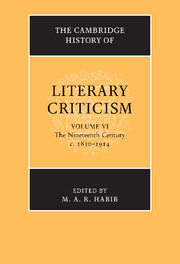Book contents
- The Cambridge History of Literary Criticism
- Series page
- The Cambridge History of Literary Criticism
- Copyright page
- Contents
- Notes on contributors
- Acknowledgements
- Introduction
- I Literary criticism as an institution
- II National developments in literary criticism
- III Critical movements and patterns of influence
- IV Later nineteenth-century developments: Realism, Naturalism, Symbolism and Decadence
- V Some major critics of the period
- VI Genre criticism
- 26 Theories of genre
- 27 Theories of the novel
- 28 Theories of poetry
- 29 Theories of drama
- VII Literature and other disciplines
- Select bibliography and further reading
- Index
28 - Theories of poetry
from VI - Genre criticism
Published online by Cambridge University Press: 05 February 2013
- The Cambridge History of Literary Criticism
- Series page
- The Cambridge History of Literary Criticism
- Copyright page
- Contents
- Notes on contributors
- Acknowledgements
- Introduction
- I Literary criticism as an institution
- II National developments in literary criticism
- III Critical movements and patterns of influence
- IV Later nineteenth-century developments: Realism, Naturalism, Symbolism and Decadence
- V Some major critics of the period
- VI Genre criticism
- 26 Theories of genre
- 27 Theories of the novel
- 28 Theories of poetry
- 29 Theories of drama
- VII Literature and other disciplines
- Select bibliography and further reading
- Index
Summary
Keywords
- Type
- Chapter
- Information
- The Cambridge History of Literary Criticism , pp. 524 - 538Publisher: Cambridge University PressPrint publication year: 2013



